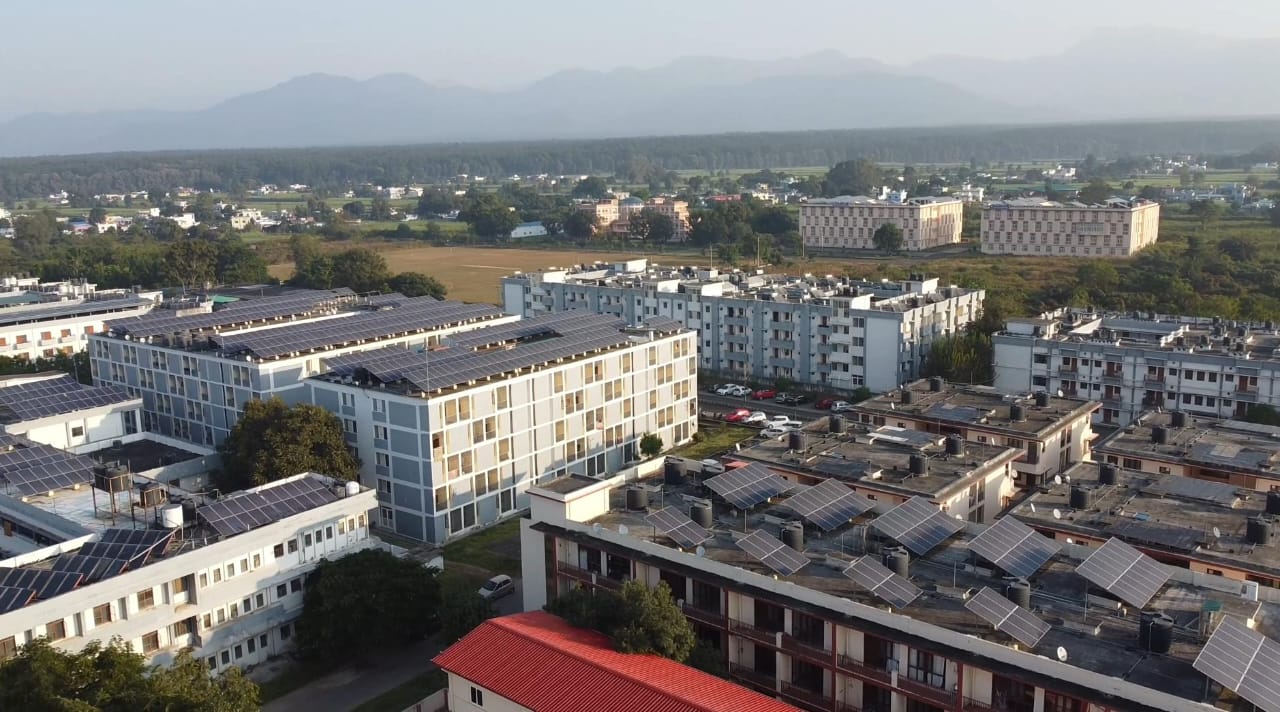National Energy Conservation Day Special (Thursday, 14th December)
SRHU Jollygrant sets an example in the field of energy conservation
- Swami Rama Himalayan University installs a 1500 kW rooftop solar plant in Jollygrant
- Since 2017, records approximately 61,15,332 kWh electricity savings*
- Meeting 16% of electricity demand through solar energy, resulting in around 1455 tons reduction in carbon emissions
- Confederation of Indian Industry (CII) awards 'Green Practices Award' in the Service category, presenting the 'Gold Award'
Today (Tuesday, 14th December) marks National Energy Conservation Day. Swami Rama Himalayan University (SRHU) through its sponsored institution, Himalayan Institute Hospital Trust (HIHT), has established itself as a hub for health and education. In this context, SRHU has played a leading role in national development by contributing to energy conservation.
According to a report, the world is nearing pre-pandemic levels of global carbon dioxide emissions. Dr. Vijay Dhasmana, Chancellor of SRHU Jollygrant, emphasizes the importance of solar energy in reducing carbon footprint, stating that solar energy is the best option for curbing the ever-growing electricity consumption in large institutions.
First Step in 2007:
Chancellor Dr. Vijay Dhasmana mentioned that the importance of solar energy is well understood at SRHU. To achieve this, a committee of experts was formed in the institution. Understanding the future needs, the first step towards energy conservation was taken in 2007. Solar water heater panels were installed in all hostels, including the Himalayan Hospital and Cancer Research Institute.
Installed the First 500 kW Rooftop Solar Panel in 2017:
Chancellor Dr. Vijay Dhasmana revealed that in 2017, a decision was made to connect with the National Solar Mission. Considering the 70% subsidy provided by the government for installing solar panels for rooftop solar energy production in Himalayan states, 500 kW rooftop solar panels were installed in Nursing and Medical Colleges.
Saving 61,15,332 kWh (units) of Electricity:
Chancellor Dr. Vijay Dhasmana informed that from 2017 till now, 1500 kW solar panels have been installed on the roofs of various buildings on the university campus. This has resulted in a saving of 61,15,332 kWh (units) of electricity for SRHU.
Providing Water to Mountains Through Solar Energy:
Chancellor Dr. Vijay Dhasmana stated that solar energy has also been used to supply water to remote villages in the mountains. In 2014, in Chureddhar Village in Tehri, water was supplied to the village through a solar pumping plant. With the help of this, there was a saving of approximately Rs. 43,000 annually, considering the daily consumption of 23 units of electricity.
Reduction of Approximately 1455 Tons of Carbon Emissions:
Chancellor Dr. Vijay Dhasmana mentioned that the danger of global warming is becoming evident. The major cause of this is carbon emissions. With the help of 1500 kW rooftop solar panels at SRHU, there has been a reduction of approximately 1455 tons of carbon emissions. This is a record compared to any institution in Uttarakhand.
Meeting 16% of Electricity Demand through Solar Energy
Girish Uniyal, Head of the Electrical and Mechanical Engineering Department, mentioned that a 3500 kW power plant has been installed in the institution according to the energy demand. In the last three years, the institution has been meeting 16% of its electricity demand through solar power plants.
Received 'Green Practices Award' from CII:
Chancellor Dr. Vijay Dhasmana informed that recently, for all these achievements of the institution, the Confederation of Indian Industry (CII) has honored the university with the 'Green Practices Award' in the service category, recognizing it with the 'Gold Award'. In this category, it is an honor for the university to be the first and only institution in North India.
Appeal to Adopt Solar Panels:
Chancellor Dr. Vijay Dhasmana said that all citizens must play an alert role in energy conservation. In the coming times, there is a significant threat to daily life from global warming. Therefore, it is necessary to develop a habit of relying on natural energy from now on. Energy conservation is essential for the protection of nature.



